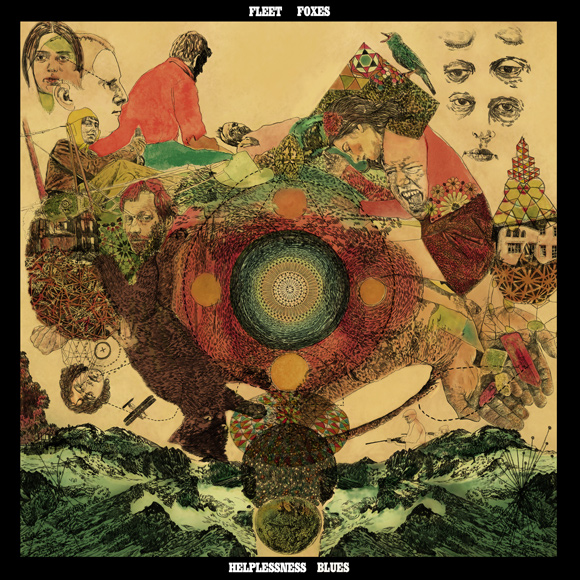“What good is it to sing helplessness blues?” Robin Pecknold asks near the middle of the song “Helplessness Blues,” on the new Fleet Foxes album of the same name. It is less a rhetorical question than it is a loaded one, yielding its own answer later in the song, with the lyric “if I had an orchard, I’d work til I’m sore.” This dichotomy, of grass-roots workmanship and lofty philosophy, the book versus the hammer, pervade Helplessness Blues from the arrangements to the tracking to the lyrics, revealing a different kind of helplessness, one that shows a master songwriter struggling with just about everything, and uncovering a voice and sense of pure beauty that may be unmatched in contemporary music.
After a critically acclaimed EP and an even more acclaimed debut LP, Fleet Foxes had more than a little to prove coming into Helplessness Blues. The album seemed on the near horizon for nearly a year before it finally appeared, after Pecknold promised a less pop-oriented affair and debuted new songs on a solo tour opening for Joanna Newsom that seemed to backup this claim. That Helplessness Blues begins with “Montezuma” plays into audience expectations of a new Fleet Foxes album: a direct-but-not-too-direct-melody, virtually-constant harmonizing, quaint lyrics referencing far-off places and long-dead figures. Should the album have gone this direction throughout, there would have been no disappointed faces and Fleet Foxes would have lived up to the lofty expectations.
But, fortunately, they did one better. As the group has shown in the past, they can offer an element of rootsy whimsy when they so desire (the first half of “Ragged Wood,” “Mykonos”). Beginning with “Bedouin Dress,” and continuing with later tracks “Battery Kinzie” and “Grown Ocean,” Fleet Foxes show an increasing strength in loftiness, the kind of tunes that don’t feel comfortable on the ground and, rather, open themselves up to flight.
But, like Morrisey has made a career of doing, Pecknold uses the gentleness of Fleet Foxes to set the stage for songs of confusions and pain. The lush arrangements (never fearing to throw in string orchestration as on “Sim Sala Bim” or a random flute solo as on “The Plains/Bitter Dancer”) at times serve as seasoning for lyrics that could come across as bitter on the wrong plate, and other times work as a chaser to soften the sting of harsh truths.
But, while it might be hard work that saves Pecknold from his helpless state (which can even come across as near-wonder on “Blue Spotted Tail”), there is a point to singing the “Helplessness Blues.” For a listener, to hear “The Shrine/An Argument,” where the apples have finally fallen from the tree and “sun shines on him no matter what he does,” offers hope. Even if the latter half of the song points to more trouble on the horizon, the triumphant music and eventual free-jazz saxophone solo points to everything working toward a satisfying conclusion.
This, of course, leads to the album conclusion, ending similarly to the sequence it opened with. Where “Montezuma” and “Bedouin Dress” offered the ideal entryway to the emotional highs and lows of Helplessness Blues, “Blue Spotted Tail” and “Grown Ocean” seek the same type of graceful exit. The former, a reflective and proverbial solo affair for Pecknold, could have easily ended the album with a pleasant conclusion, leaving the audience in the same solitary headspace that the singer seems content in dwelling. But instead, the band again does one better, with the triumphant “Grown Ocean.” Fleet Foxes have become a band who will not stop pushing, who will challenge themselves to avoid stagnancy, who will work with both their instruments and their minds. Because of that, the audience is able to reap the fruit and feast on it together.


